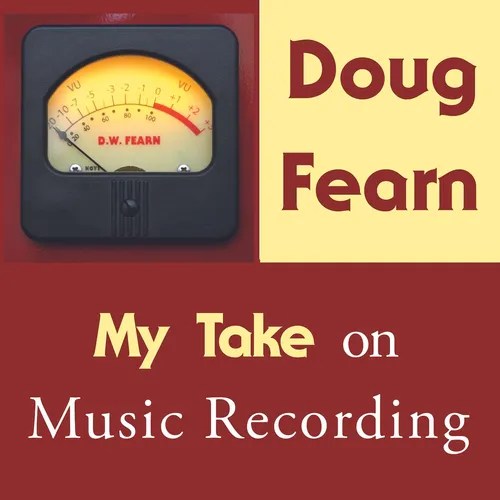
My Take on Music Recording with Doug Fearn
Doug Fearn draws on his 50+ years as a recording engineer, record producer, studio owner, and pro audio equipment designer to explain the art and science of recording for the audiophile, music lover, and people in the music recording industry.
- Update frequency
- every 19 days
- Average duration
- 38 minutes
- Episodes
- 108
- Years Active
- 2020 - 2025

Listening
For anyone working in music recording, hearing is vital. But so also is our ability to listen.
In this episode, I talk about the two ways of listening, and why both are important. Can yo…

Your Recording Style
If everyone recorded music the same way, everything we did would sound the same. But we don’t record the same way, and those differences are part of what makes up our recording style.
In…

Studio Technology for Musicians Part 3 (with Corrie Lynn Green)
In this third and final part of my conversation with Corrie Lynn Green, we deviate somewhat from the technology of the studio and discuss the role of the producer.
There are plenty of a…

Studio Technology for Musicians Part 2 (with Corrie Lynn Green)
In the previous episode, I had a conversation with singer-songwriter Corrie Lynn Green explaining some aspects of studio technology and how it applies to musicians.
In this second insta…

Studio Technology for Musicians (with Corrie Lynn Green)
For many musicians, recording in a professional studio can be an overwhelming experience at first. There is a lot going on, it’s all very technical and mostly incomprehensible. Jargon i…

The Future of Vacuum Tubes & What Might Have Been
In the late 1800s, researchers were seeking a way to amplify an analog signal. The vacuum tube was invented in the early 1900s, but scientists were also investigating the properties of …

Session Sociology
Music recording is a technological process, but it also involves people. The technology exists to serve musicians, and the process of recording must consider the personalities of the pe…

Karttikeya of Music Together International
There are many different uses for recorded music, and we explore a somewhat unusual application in this episode. My guest is Karttikeya. He only uses one name. He is the engineer and of…

Tuning
The instruments on a recording should all be in tune with each other, right? In this short episode, I discuss how instruments are tuned, and why even with today’s remarkable tuning devi…

A Recording, Deconstructed
I take a behind-the-scenes look at a recent recording project I am working on as producer and engineer, explaining the technical details of the session, along with the pre-production pl…

Recording Critiques - The first Five
In the previous episode, I asked listeners to send me their recordings for my critique. In this episode, I play five of the songs submitted and offer my comments.
I try to limit my remar…

Recording Critiques
Recently several people have suggested that I do a series of episodes featuring listener-submitted recordings for my critique.
At first, I was not particularly enthusiastic about this id…

Stereo Mic'ing Techniques
Stereo has added new dimensions to our recordings, an effect that is difficult or impossible to achieve in monaural recordings. New immersive formats, such as Dolby Atmos, add even more…

Chuck Anderson, Part 2
My conversation with jazz guitarist, composer, writer, and teacher, Chuck Anderson continues in this episode. We talk about recording his early albums, his trio, solo guitar composition…

Chuck Anderson guitarist/teacher/recording artist
Chuck Anderson is an amazing musician. Not only is his technique on guitar remarkable, he is also a solid businessman who has made his living from music since he was a teenager. Over hi…

Studio Drummer John O'Reilly Jr.
John O’Reilly Jr. is a studio drummer who spends most of his time recording drum tracks for clients in his studio. He talks about his experiences leading up to his business, “Boom Crash…

DSD Recording with George & Geoff Hazelrigg
Direct Stream Digital (DSD) is a different way to record music in a digital format. The concept goes back to the 1930s, and it has been used to record music for at least 20 years. But D…

Audio Quality with George & Geoff Hazelrigg
Geoff and George Hazelrigg are not only my business partners, but also superb musicians with decades of studio experience.
We seem to always agree on what makes a compelling recording. I…

Dolby Atmos explained by Dale Becker
Major record labels and other music providers are committed to adopting Dolby Atmos and other immersive audio technologies. There is a huge amount of work available to re-mix a label’s …

Robin Eaton: Songwriter, Musician, Studio Owner
Robin Eaton is a songwriter, musician, vocalist, and studio owner based in Nashville. I’ve known Robin for over 40 years, since he lived in nearby Wilmington, Delaware. He came into my …